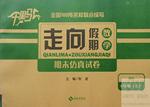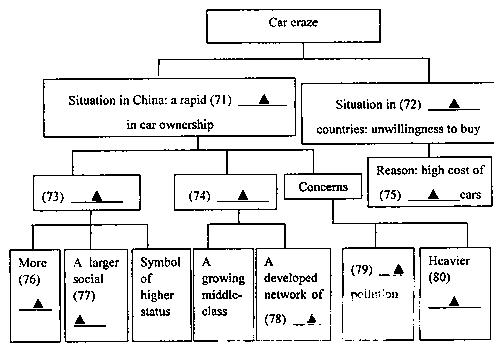
.A 2008 federal law requires that all schools online safety education programmes but still a number of teachers in the USA ill-prepared to educate students on it.
A.offer, are B.offered, is C.should offer, is D, be offered, are
 千里马走向假期期末仿真试卷寒假系列答案
千里马走向假期期末仿真试卷寒假系列答案科目:高中英语 来源: 题型:阅读理解
请认真阅读下面短文,并根据所读内容在文章后表格中的空格里填入最恰当的单词。注意:每空格只填1个单词。
The Auto Show, which is being held right now in Beijing, has risen to the top ranks of global auto industry events, as China has become the world's biggest auto market.For many Chinese youngsters, having a car has become a new lifestyle reflecting freedom and success
First, there is the thrill of individual mobility and freedom, going from one place to another in their own time, and on their own terms.
"I like the speed; I like the freedom; I can't imagine not having a car," Hou Mingxin, 39, owner of two cars, told the Financial Times.
And these youngsters don't just want freedom through car ownership, but also a larger social circle.Thanks to the Internet, car owners can band together for leisure activities, such as going strawberry picking in the countryside.It is an activity that many car lovers would never have attempted without the benefits of a car.
In China, the car is also a status symbol."It's an opportunity to declare personal success," said Michael Dunne, a Shanghai-based managing director of J.D.Power and Associates, an auto industry group."The small, environmentally-friendly models are not best sellers in China.The Chinese are crazy about big cars, a symbol of achievement," said Dunne.
Thanks to a growing middle-class, and an increasingly developed network of roads, the number of car owners in China is rapidly increasing. China last year replaced the US and became the world's largest car market with 13.6 million vehicles sold.
But the car craze(狂热) has raised environmental and traffic concerns. Many worry that car emissions could take pollution to a new level. Heavy traffic also troubles many Chinese cities.
China is discovering the romance of the road just as developed countries seem to have lost it. “The younger generation in mature markets is unwilling to buy cars, especially in Europe and Japan," says Klaus Paur, of TNS Auto in Shanghai.
In developed countries, owning a car can be expensive, with the parking fees car insurance and various taxes, said a 2008 article in US magazine Newsweek.
"Having a car is so 20th century," Kimiyuki Suda, a young white collar worker from Tokyo told Newsweek.He mostly uses subways and trains."It's not inconvenient at all."

查看答案和解析>>
科目:高中英语 来源:广东省江门市六校2010届高考最后阶段猜题卷(英语) 题型:写作题
读写任务
阅读下面的短文,然后按照要求写一篇150词左右的英语短文。
Nowadays, the pressures on schools and teachers are often passed on to students and parents. Students are tested more and assigned more homework. In the past 25 years, homework assignments have risen by 51% according to a 2008 study at the University of Michigan. That is an average of 12 extra hours of homework per week!
Excessive homework often leaves no time for students to have fun or do something for themselves. Many parents spend at least three hours every night going through their children's work.
However, the governments' efforts to cut the homework burden of primary and middle school students have drawn mixed reactions. Ironically, though teachers have been widely criticized for piling on homework, it is parents who sometimes ask for more work for their children! When teachers don't give homework, some parents will go to the school and complain. They want teachers to assign homework every day as a means of making sure teachers do their job and the children have work to do.
【写作内容】
你们班级打算就“Homework”这一主题召开一次班会。并发给每人一份上面的英语短文,你和同学都积极响应,并打算就这一主题发表各自的看法。请你准备写一份发言稿,内容要点包括:
1.以约30词概括短文的要点;
2.然后以约120词谈谈你的看法和认识,内容包括:
(1)你认为过多的家庭作业对中学生来说有必要吗?为什么?
(2)你如何看待作业负担的问题。
【写作要求】
1.在作文中可以使用自己的亲身经历或虚构的故事,也可以参照阅读材料的内容,但不得直接引用原文中的句子。
2.作文中不得出现真实姓名和学校名称。
查看答案和解析>>
科目:高中英语 来源:2011届江苏省南京师大附中高三学情调研考试英语卷 题型:阅读理解
请认真阅读下面短文,并根据所读内容在文章后表格中的空格里填入最恰当的单词。注意:每空格只填1个单词。
The Auto Show, which is being held right now in Beijing, has risen to the top ranks of global auto industry events, as China has become the world's biggest auto market.For many Chinese youngsters, having a car has become a new lifestyle reflecting freedom and success
First, there is the thrill of individual mobility and freedom, going from one place to another in their own time, and on their own terms.
"I like the speed; I like the freedom; I can't imagine not having a car," Hou Mingxin, 39, owner of two cars, told the Financial Times.
And these youngsters don't just want freedom through car ownership, but also a larger social circle.Thanks to the Internet, car owners can band together for leisure activities, such as going strawberry picking in the countryside.It is an activity that many car lovers would never have attempted without the benefits of a car.
In China, the car is also a status symbol."It's an opportunity to declare personal success," said Michael Dunne, a Shanghai-based managing director of J.D.Power and Associates, an auto industry group."The small, environmentally-friendly models are not best sellers in China.The Chinese are crazy about big cars, a symbol of achievement," said Dunne.
Thanks to a growing middle-class, and an increasingly developed network of roads, the number of car owners in China is rapidly increasing. China last year replaced the US and became the world's largest car market with 13.6 million vehicles sold.
But the car craze(狂热) has raised environmental and traffic concerns. Many worry that car emissions could take pollution to a new level. Heavy traffic also troubles many Chinese cities.
China is discovering the romance of the road just as developed countries seem to have lost it. “The younger generation in mature markets is unwilling to buy cars, especially in Europe and Japan," says Klaus Paur, of TNS Auto in Shanghai.
In developed countries, owning a car can be expensive, with the parking fees car insurance and various taxes, said a 2008 article in US magazine Newsweek.
"Having a car is so 20th century," Kimiyuki Suda, a young white collar worker from Tokyo told Newsweek.He mostly uses subways and trains."It's not inconvenient at all."
查看答案和解析>>
科目:高中英语 来源:2010-2011学年浙江省高三上学期高考考试样卷英语卷 题型:阅读理解
For years, there has been a bias (偏见) against science among clinical psychologists (临床心理学家). In a two-year analysis to be published in November in Perspectives on Psychological Science, psychologists led by Timothy B. Baker of the University of Wisconsin charge that many clinical psychologists fail to “provide the treatments for which there is the strongest evidence of effectiveness” and “give more weight to their personal experiences than to science.” As a result, patients have no guarantee that their “treatment will be informed by … science.” Walter Mischel of Columbia University is even crueler in his judgment. “The disconnect between what clinical psychologists do and what science has discovered is an extreme embarrassment,” he told me, and “there is a widening gap between clinical practice and science.”
The “widening” reflects the great progress that psychological research has made in identifying (确认) the most effective treatments. Thanks to strict clinical trials, we now know that teaching patients to think about their thoughts in new, healthier ways and to act on those new ways of thinking are effective against depression, panic disorder and other problems, with multiple trials showing that these treatments — the tools of psychology — bring more lasting benefits than drugs.
You wouldn’t know this if you sought help from a typical clinical psychologist. Although many treatments are effective, relatively few psychologists learn or practice them.
Why in the world not? For one thing, says Baker, clinical psychologists are “very doubtful about the role of science” and “lack solid science training”. Also, one third of patients get better no matter what treatment (if any) they have, “and psychologists remember these successes, believing, wrongly, that they are the result of the treatment.”
When faced with evidence that treatments they offer are not supported by science, clinical psychologists argue that they know better than some study what works. A 2008 study of 591 psychologists in private practice found that they rely more on their own and colleagues’ experience than on science when deciding how to treat a patient. If they keep on this path as insurance companies demand evidence-based medicine, warns Mischel, psychology will “discredit itself.”
1.Many clinical psychologists fail to provide the most effective treatments because ________.
A. they are unfamiliar with their patients B. they believe in science and evidence
C. they depend on their colleagues’ help D. they rely on their personal experiences
2.The widening gap between clinical practice and science is due to _______.
A. the cruel judgment by Walter Mischel
B. the fact that most patients get better after being treated
C. the great progress that has been made in psychological research
D. the fact that patients prefer to take drugs rather than have other treatments
3.How do clinical psychologists respond when charged that their treatments are not supported by science?
A. They feel embarrassed. B. They try to defend themselves.
C. They are disappointed. D. They doubt their treatments.
4.In Mischel’s opinion, psychology will ____.
A. destroy its own reputation if no improvement is made
B. develop faster with the support of insurance companies
C. work together with insurance companies to provide better treatment
D. become more reliable if insurance companies won’t demand evidence-based medicine
查看答案和解析>>
科目:高中英语 来源:2010-2011学年江苏省高三学情调研考试英语卷 题型:填空题
请认真阅读下面短文,并根据所读内容在文章后表格中的空格里填入最恰当的单词。注意:每空格只填1个单词。
The Auto Show, which is being held right now in Beijing, has risen to the top ranks of global auto industry events, as China has become the world's biggest auto market.For many Chinese youngsters, having a car has become a new lifestyle reflecting freedom and success
First, there is the thrill of individual mobility and freedom, going from one place to another in their own time, and on their own terms.
"I like the speed; I like the freedom; I can't imagine not having a car," Hou Mingxin, 39, owner of two cars, told the Financial Times.
And these youngsters don't just want freedom through car ownership, but also a larger social circle.Thanks to the Internet, car owners can band together for leisure activities, such as going strawberry picking in the countryside.It is an activity that many car lovers would never have attempted without the benefits of a car.
In China, the car is also a status symbol."It's an opportunity to declare personal success," said Michael Dunne, a Shanghai-based managing director of J.D.Power and Associates, an auto industry group."The small, environmentally-friendly models are not best sellers in China.The Chinese are crazy about big cars, a symbol of achievement," said Dunne.
Thanks to a growing middle-class, and an increasingly developed network of roads, the number of car owners in China is rapidly increasing. China last year replaced the US and became the world's largest car market with 13.6 million vehicles sold.
But the car craze(狂热) has raised environmental and traffic concerns. Many worry that car emissions could take pollution to a new level. Heavy traffic also troubles many Chinese cities.
China is discovering the romance of the road just as developed countries seem to have lost it. “The younger generation in mature markets is unwilling to buy cars, especially in Europe and Japan," says Klaus Paur, of TNS Auto in Shanghai.
In developed countries, owning a car can be expensive, with the parking fees car insurance and various taxes, said a 2008 article in US magazine Newsweek.
"Having a car is so 20th century," Kimiyuki Suda, a young white collar worker from Tokyo told Newsweek.He mostly uses subways and trains."It's not inconvenient at all."

查看答案和解析>>
湖北省互联网违法和不良信息举报平台 | 网上有害信息举报专区 | 电信诈骗举报专区 | 涉历史虚无主义有害信息举报专区 | 涉企侵权举报专区
违法和不良信息举报电话:027-86699610 举报邮箱:58377363@163.com